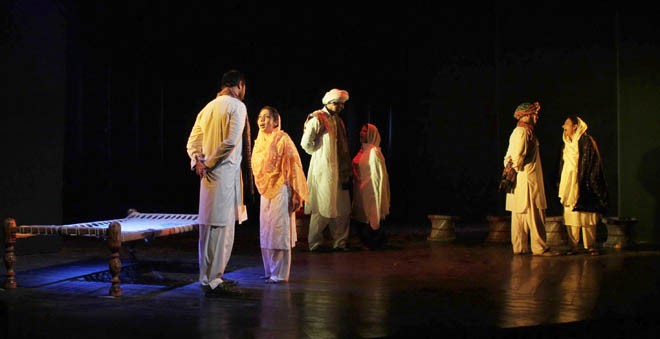

Ajoka has been one of the major theatre groups in the country and it has been around for almost 30 years. The avowed aim of the group has been to make its audiences aware of what they have been missing by highlighting the great injustices and lop-sided division of resources among them, both as individuals and groups.
Some issues in society are beyond debate and there can be no two opinions about them. Kari is one custom where the blame for an act committed by an individual is levied at the entire tribe or family and revenge is sought from them. And then in that family or tribe , since women are considered to be in a weaker position, they are made to pay the ultimate price.
The play Maino Kari Karende Ni Mai has been performed by Ajoka for over 20 years in the length and breadth of the country, at times in the very heartland where this custom is still considered to be the most viable option in the dispensation of justice. Written by Shahid Mehmood Nadeem and directed by Madeeha Gauhar, the recent production was titled "Kari" and staged at the Alhamra last week along with Hotel Mohenjodaro, a play based on the short story Dhanak by Ghulam Abbas published in the late 1960s.
The production was in collaboration with CAMP, an NGO that has worked in under privileged areas and discriminated communities in FATA Khyber Pakhtunkhwa and Balochistan responding to emergencies and promoting human rights, peace and security. They have also worked to improve access to health, education besides creating livelihood opportunities.
Ajoka now has a fairly a large number of plays in its repertoire and from time to time it produces one of these plays for audiences who may not have seen the play earlier or just want to be part of the experience once again. It is perhaps not a fair expectation that a group even as prolific as Ajoka should be mounting a new production every time they become active again. Usually groups all over the world are known for their signature productions and Ajoka has a few, like Bullah.
It is also not fair to expect the group to come out with a new interpretation of the play that it has done earlier, though it would be a highly desirable outcome. The expectation of a new interpretation from another group of a classic, or a popular play is a legitimate expectation. And only if done like its prototype can be castigated for being a mere imitation, otherwise it is hailed as an addition to the body of productions.
In this production two locations were identified, one where the jirga was held and the other was the women quarters, the action was divided by quick and small scenes alternating between these two. It was managed by lighting up respective parts of the stage that had very few props.
The cast included Razia Malik, Samina Butt, Tazeem Sadiq, Sana Sehar, Rizwan Baloch, M. Qaiser, Usman Asghar, Sohail Tariq, Zubair Sajid and Shahzad Sadiq. Like many other production there was live music, the vocals were provided by Kamran Khokhar and the percussion on the dholak by Thomas Khokar.
In ordinary times doing a play or even a concert of musicians is a harmless activity but in the times that we live in, putting up a cultural show can be a valiant act, a life-threatening one, especially when the shows are also pointed as this one. The risk grows by the same ratio. It must be said repeatedly and commended that groups like Ajoka have been quite consistent in waging their battle and have not recoiled under threats or stiff opposition.
The theme of the play, too, has many opponents in different sections and groups of society and the response can get nasty if not outrightly violent.
It should not be forgotten that groups like Ajoka were not allowed to perform at venues like the Alhamra, and ironically now it is considered to be a safer place as all cultural venues should be for performances. Ideally speaking, such venues should also be centres for free expression in the arts, exchange of creative ideas and guarantee a certain liberty of association between people from different backgrounds. Even with qualification, it is hoped that it remains this way. If there has to be a change it should be for greater freedom rather than more restriction in the name of Puritanism or Patriotism.